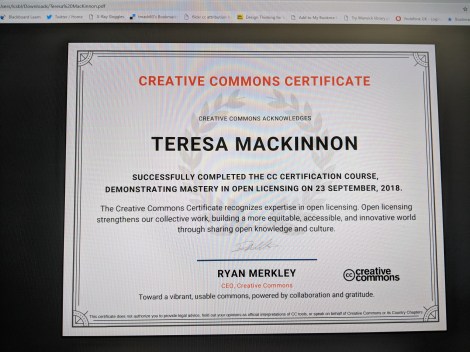
As an open educational practitioner Creative Commons licences have been central to my practice online and when the opportunity came along to complete an accredited course online over the summer I was eager to graps it. The course lasted 10 weeks and was fully online. Tasks included the creation of CC BY resources to demonstrate understanding of copyright law, Creative Commons and the use of open licences in teaching. I am going to share my two final task submissions here.
Firstly, my response to Task 5 which deals with my personal motivation for taking the course and my work context. And secondly, pasted below the text for my final project, which took the UK policy environment as a case study for Creative Commons in education.
Case Study: Write a country case study, no more than 500 words. The case study should highlight a non-North American country’s particular copyright environment (laws, and public norms) and describe the use or lack of use of Creative Commons licenses. Describe why and how the copyright, publishing, or academic traditions enable or limit opportunity for engagement with Creative Commons licenses. Cite your sources.
My response:
“Once I started using the internet as a teaching tool the national boundaries were blurred, it became more simple to illustrate national differences in the classroom using websites. However, it also became more challenging as it was not always clear what could be shared through a virtual learning environment. I remember emailing Yves Duteil to ask for his permission to include his music in my French teaching. Obligingly he replied positively and I still keep his email to this day. This was the early internet, free and friendly. I felt that we were making great social progress. Some years later I compared notes with an Australian colleague who also saw the value in teaching through popular culture and we wrote this article together to explain the headaches we experienced as digital practitioners. The confusion caused by a legal system that was not fit for purpose in a digital age. For us this was not just irritating, it threatened the very practice of language teaching, undermining the need to be current and stimulating in order to engage learners. It also threatened the collegiality and sustainability of teaching practice, an idea which we investigated further in this article.
The UK is a signatory to the Berne convention and has signed major international agreements to grant some exceptions to copyright. The UK’s Intellectual Property Office website provides communication about the national position on such matters including the economic and moral rights available to copyright holders. However, a search on the site provides no reference to Creative Commons licences. There is a section on exceptions but a close and detailed reading of these shows that the Government puts great faith in the market to address any imbalance in commercial and personal requirements from copyright. For example it is acceptable to make a copy of a work in an accessible format for those with a disability IF ” a copy that would be accessible to you is not commercially available”. This is framed in a rather patronising manner in my opinion – business is doing disabled people a favour, we should appreciate it. Creating copies for educational purposes may require paying a licence fee, and so me can assume that money talks and is a barrier to access educational opportunities. This is a huge hurdle to learning in the current UK climate where institutional budgets are tight and personal debt is seen as the way to manage access to education.
Without a fairer, more balanced approach to managing the demands of capitalism with the social dynamics of education the UK looks to be favouring the exploitation of its citizens rather than supporting them in their contribution to a dynamic, innovative modern economy. I would like to see teachers and students reclaiming their copyright through the use of CC licences, declaring their commitment to learning as a human right accessible to all no matter what their means.”
I am getting closer to the end of my career as a professional educator after over 30 years, but for those of you who may be considering teaching as a career perhaps you can understand why I will continue to campaign for greater transparency and protection of the fundamental human right to access quality education in the UK. Understanding how the laws which govern us play a fundamental role in supporting social mobility and equity are part of this and I would maintain that Creative Commons licencing is a way of asserting our right to share our own work. Why not include them in your professional development?
Don’t be fooled, these are dark days.
